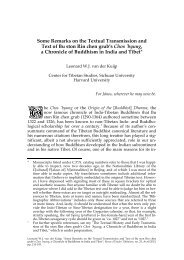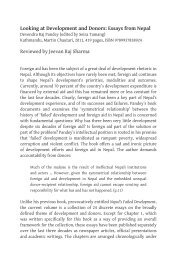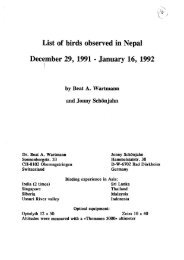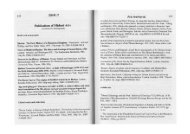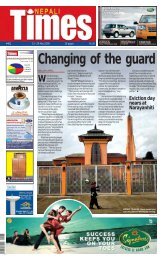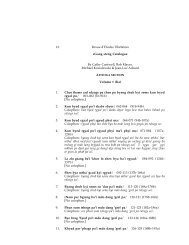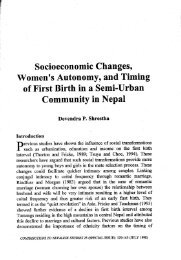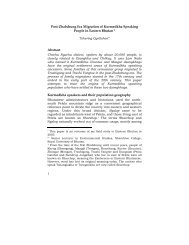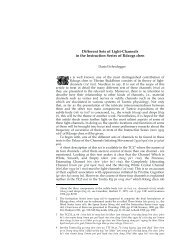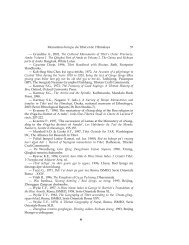Create successful ePaper yourself
Turn your PDF publications into a flip-book with our unique Google optimized e-Paper software.
Maoist movement because I wanted to<br />
free our people,” Sangam says. He became<br />
a fighter at 15 and took part in several<br />
raids, one of them two years ago in<br />
which 32 police officers were killed and<br />
31 captured and freed after a month.<br />
Sangam was shot in the hands.<br />
In another village, Pipal, a Maoist<br />
official Ganesh Man Pun outlined ambitious<br />
goals of building roads, bridges,<br />
hydroelectric plants and schools. “Our<br />
aim is to have an autonomous people’s<br />
government where people seize the<br />
power for themselves,” says Pun.<br />
Rukum, a district of beautiful mountains<br />
and valleys, is the Maoists’ de facto capital.<br />
They patrol with guns and grenades<br />
as farmers mostly tend their vegetable<br />
crops. The region’s capital is Musikot,<br />
whose 6,000 people live behind a fence<br />
and, after nightfall, under curfew.<br />
The 500 soldiers and 300 policemen<br />
rarely venture beyond the fence. “We<br />
have full security inside the district headquarters,<br />
but outside thefence we have<br />
nation weekly | MAY 30, 2004<br />
a big security problem,” acknowledges<br />
Chet Prasad Upreti, Musikot’s chief district<br />
administrator. The town is besieged.<br />
The only way around rebel roadblocks<br />
is by air. Food stocks<br />
are diminishing.<br />
“We have grains to<br />
last a few more days and<br />
after that we are all going<br />
to starve,” said Dil<br />
Ghimire, who runs a<br />
small hostel in Musikot.<br />
The government tried<br />
airlifting grain, but the<br />
Maoists burned down<br />
the storage shed. Among<br />
the refugees living in Musikot is Nayan<br />
Singh Damai, 65. He says he was attacked<br />
en route to a political rally in 1998 and injured<br />
so badly that he lost a leg. Doctors in<br />
Katmandu gave him an artificial leg, but<br />
the Maoists would kill him if he tried to<br />
make the four-hour walk to his village, so<br />
his wife visits him twice a year, he says.<br />
“My only offense was I had different<br />
political beliefs” says Chhetri. The<br />
rebels have their own courts, judges, tax<br />
system and schools. Teachers like<br />
Ghimire give away five percent of their<br />
monthly income to the Maoists.<br />
Teachers like<br />
Ghimire give away<br />
five percent of their<br />
monthly income to<br />
the Maoists.<br />
Farmers and businessmen pay according<br />
to their assets.<br />
The rebels say defendants facing their<br />
courts have the right to attorneys, who have<br />
no legal education and<br />
are usually picked by<br />
the rebels. A sevenmember<br />
jury of villagers<br />
must reach a unanimous<br />
verdict. Defendants<br />
are tried in an<br />
open-air courtyard, facing<br />
a judge at a desk and<br />
jurors seated on a mat.<br />
“There will be a<br />
day when all of Nepal<br />
will follow this system,” says Rupesh<br />
Mainali, chief of the rebels’ law and justice<br />
department. A woman who killed<br />
another woman brought home by her<br />
husband is given a seven-year sentence;<br />
a rapist is serving three years. Their<br />
prison is a house seized by the rebels<br />
from a landlord who had to flee to the<br />
district capital. Their punishment includes<br />
working in farm fields or carrying<br />
supplies.<br />
(Gurubacharya, an Associated Press reporter,<br />
visited Rukum last month.)<br />
25






